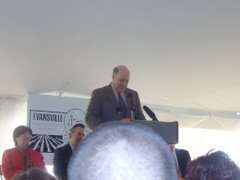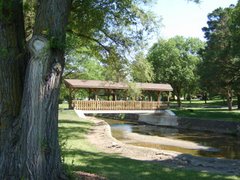(Ed. Note: This memo was in the packet for last Tuesdays Evansville Common Council. The list of individual communites that have a stormwater utility will be in a separate post.)
October 23, 2007
To: Public Works Committee
From: Dan Wietecha, City Administrator
Re: Stormwater Utility Overview
A stormwater utility may be created to manage the stormwater system throughout the city. User fees would be established proportionate to the amount of stormwater runoff occurring from each individual property. It is primarily for maintenance, but also to fix existing deficiencies throughout the drainage system. New development still required to install ponds etc at own expense.
There are at least 60 stormwater utilities in the state, and they are becoming more common in response to tight budgets and increased requirements for water quality. A principal advantage to using a utility (rather than paying for stormwater taxes through property taxes) is that it more equitably allocates the costs based on the amount of runoff produced by each property.
Statutory authority for a stormwater utility is Wisconsin Statutes, Sections 62.11, 62.18 and 66.0821.
There may be two ways to charge utility fees for stormwater: 1) create a new utility district or 2) establish the fee as a separate line item on an existing sewer utility.
A stormwater utility is not an immediate fix. Several factors need to be considered beforehand, and (if creating a new district) it can still be four months for state approval.
Are the district boundaries the city limits or extend into the township?
What is the acreage categorized by residential, commercial, agricultural, etc?
How many parcels categorized by residential, commercial, agricultural, etc?
Equivalent Runoff Unit (ERU) is typically set at the average impervious surface area for a single family house. Is this the right mechanism for Evansville? And, what is the right measure for an ERU?
Some cities provide credits for properties or developments that reduce their runoff below some threshold; is this appropriate for Evansville?
Identify existing stormwater-related expenses (eg: streetsweeping, ditch cleaning, leaf collection, storm sewer maintenance, etc) – prelim estimate $79,000/year.
Identify future stormwater-related expenses (eg: items identified to improve our floodplain CRS score, capital improvements, billing).
Develop several-year budget.
Public education about the proposed utility – How will it benefit the entire city (not just one neighborhood)? How will it affect property taxes? What are long-term plans for the utility (not just dig a pond for one neighborhood)? How is it coordinated with other city practices (eg: effort to improve our floodplain CRS score)?
Thursday, November 15, 2007
Background: Memo from Evansville City Administrator Dan Wietecha re: Overview of Stormwater Utility Concept
Subscribe to:
Post Comments (Atom)






























No comments:
Post a Comment